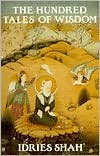

 |

|

The average rating for The Hundred Tales of Wisdom based on 2 reviews is 4 stars.
Review # 1 was written on 2016-10-14 00:00:00 Bruce Haggar Bruce HaggarGIVE ME THE WHOLE, NOT THE PARTS A man went to a tattooist, asking him to put the picture of a lion on his skin. But this man was a coward. When he felt the first prick, he said: "Which part of the lion are you drawing?" The tattooist said: "The tail." The man cried: "Let us not have a tail! Do another part!" The artist did as he was told. But the man screamed with pain again. And this went on and on, until the artist told him that it was impossible to tattoo a lion at all, if he would not allow any of its parts to be drawn. |
Review # 2 was written on 2016-01-25 00:00:00 Mark Wd Thompson Mark Wd ThompsonThose who love Rumi's poetry and want to know more about the amazing mind that could write such extraordinarily beautiful and insightful verse, may find _The Hundred Tales of Wisdom_ (collected and compiled by Idries Shah) very interesting. It gives us a picture of Rumi's personality via the recorded recollections of individuals who were around him when he was alive. The language is a little archaic, but how could you expect otherwise from the first-hand accounts of individuals who in the 11th century? Those were very different times and you can get a sense of those times, almost a feel for the air that was breathed, from reading these accounts. They ways in which they are phrased indicates that an 11th century man was a very different type of person than a 21st century man. And I found myself a little sad about that. Those times, as difficult as they might have been, seemed so much cleaner; the people, fare purer of intention. But that might be because I'm reading the accounts of those who were disciples of Rumi, and close to enlightened saints themselves, not stories from ordinary people from that period in history. I think that these multiple, brief accounts of extraordinary incidents in Rumi's life by eye-witnesses gave me a better image of what this man was really like, mysterious and strange as it is, than a "proper" biography would have because these accounts have come down, orally and then written down, through the centuries as recorded facts and an emphasis was placed (as was placed on the sayings and doings of Mohammad) on keeping the historic record of actual events clean; not altering or interpreting what happened. These accounts are not the loose-with-the-facts, interpretive stories that many biographers, when faced with a sensational or "unmodern" subject like to spin in order to explain his inexplicable life to contemporary minds. There is no invented explanation or attempt to modernize in these stories, just brief "I was there and saw this or heard that" accounts. And what was seen or heard, by so many individuals, was remarkable. For me, they helped answer an unspoken, unthought question I'd vaguely felt when reading Rumi: how could any human being born on this earth possibly write such unusual and insightful poetry, poetry that seems to come from unfathomable distances far beyond the typical human life? Like many books written by Sufis, this one can be difficult to grasp for those already "comfortable" with a certain style of literature. As a person interested in and trying to learn from Idries Shah's writings, I certainly found that to be so, although I get the strange sense that there is treasure here under the strange and unfamiliar surface, despite my ineptness at digging for it. There are as many reasons for this difficulty (if not more) as there are tales of wisdom in this book, but the one I most notice is that Sufi books are written to have certain effects, and if, to accomplish their goals, they take a form that someone is not used to seeing or doesn't finds as entertaining as other books, that reader may be disappointed and judge the book sub-par . That was the case with me. I assumed from the title that this was another Shah story collection and I expected the short, pithy "ah-ha! moment" stories one often finds in Idries Shah's other collections, such as _Wisdom of the Idiots_ or _Tales of the Dervishes_. My expectations were disappointed: this collection of short, biographical incidents is a very different sort of book, a type I don't understand but would like to. I'm trying to say, in a roundabout way, that it's far too advanced for me. But never fear! Those, like myself, looking for their typical Shah "oh wow, that's so profound! entertainment fix can get it near the end of the book where there is a small compilation of the usual stories in the format they are comfortable with: the ones he has typically compiled. I have to admit, I heaved a huge mental sigh of relief when I saw those more "normal" tales: at last, something I recognized! It was only later when I started to wonder why Shah put those isolated stories, almost like an afterthought, into a book of ancient biographical accounts of a miracle-working saint and great poet. Was it to reassure dopes like me who expect Idries Shah to serve up oats or perhaps porridge but never broccoli? Hmmm.... At any rate, based on my experience, I wouldn't recommend jumping ahead to that small section, however, as you just might miss a jewel or two in what might possibly be a single-minded but misguided search for wampum beads. |
CAN'T FIND WHAT YOU'RE LOOKING FOR? CLICK HERE!!!